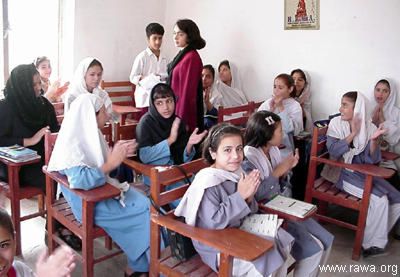Sher Ahmad Haidar
GHAZNI CITY: Insecurity and intimidation by gunmen kept some 50,000 school-age children away from continuing their education during the past year in the southern province of Ghazni, officials say.
During the past academic year, most of the schools in Gelan and Nawa districts were closed and teachers and students were asked to stay home even some were threatened to death if they ignored the warning.
The provincial education department officials say the number of school-going students in the two districts is about 15,000.
In Moqur, Qarabagh, Andar, Waghaz and Khogyani districts, only girl schools were closed after threats were received from armed groups, said the officials.
Mohammad Shafiq Hemat, an official of education department in Ghazni, said the number of girl students in the five mentioned districts is approximately 11,000.
He told Pajhwok Afghan News that in some districts, namely in Awband, Gero and Zanakhan, there were no girls schools at all and there was still little interest to send females to education due to due to lack of security.
Hemat said that 13 schools had been put on fire by unknown gunmen in last three years around Ghazni.
Shamsullah, chief of education department in Gelan district, said they had held talks with the gunmen opposing schools through local elders, but to no avail.
A student of Agho Jan high school in Gelan district said that no one can go to school due to fear from the anti-government militants.Agho Jan high schools was set on fire early last year and the students and teachers were threatened not to attend the classes.
Qara Bagh district faced similar problems during 2006 in terms of schools. Education department chief of the district was shot dead by Taliban fighters in middle of the year.
Totaling number of the students who left schools due to threats and fear of the gunmen, Hemat calculated that up to 50,000 children were deprived of continuing their education in 2006.
In addition to the gunmen closing schools for girls, religious scholars in the area also put restrictions on female education.
Members of the parliament from the provincial constituency of Ghazni have also complained that education in Ghazni is not balanced and blame government officials for making lack of security as an excuse in remote areas.
However, Muhammad Seddiq Patman, deputy education minister said it was the people's responsibility, not of the government, to protect public properties, like schools and hospitals.
He noted that education for children can be ensured only with cooperation of local people in maintaining of security. He took the blame to local residents for allowing militants to operate in their areas freely and prevent their children from schools.
Jawid Alami, Ghazni provincial governor spokesman said that the security was the only problem for schools in remote areas, adding that the government was making every effort to bolster the situation by launching reconstruction and development projects in the affected areas.




